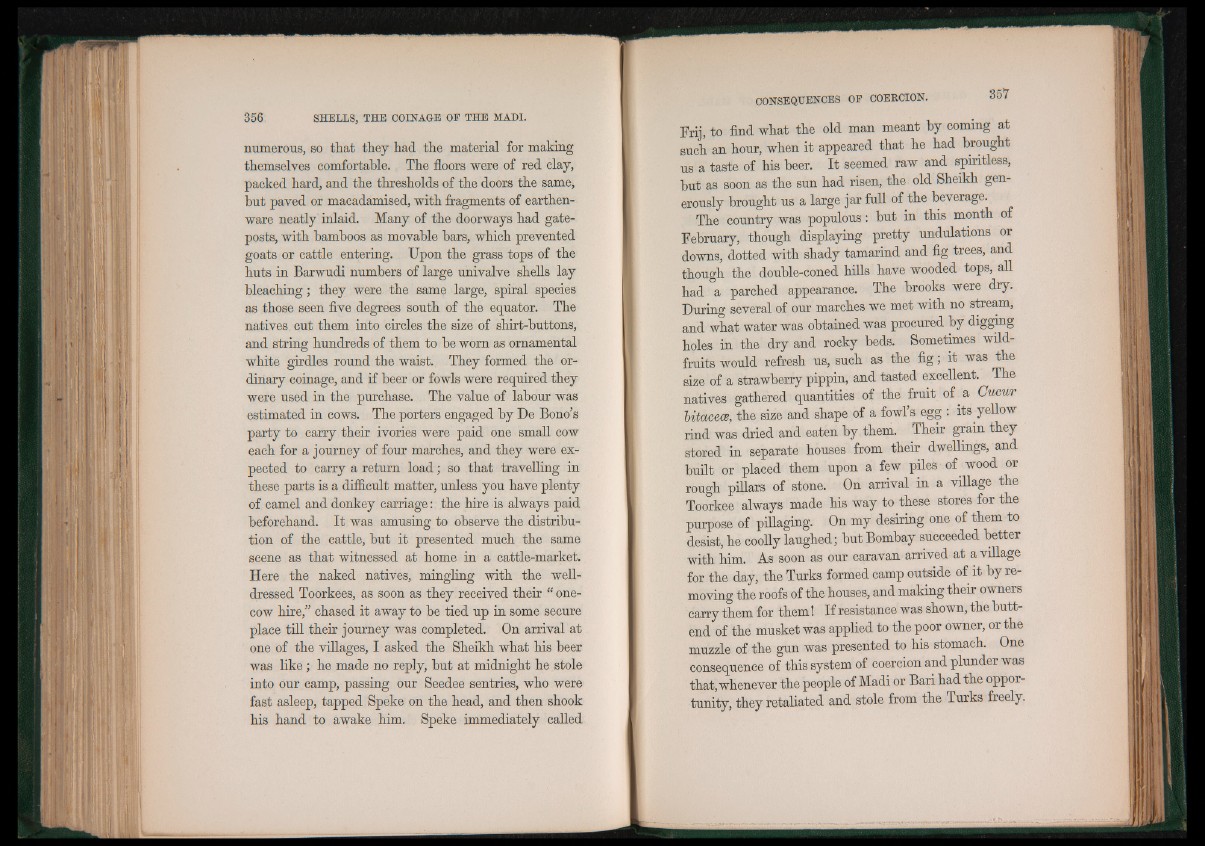
numerous, so that they had the material for making
themselves comfortable. The floors were of red clay,
packed hard, and the thresholds of the doors the same,
but paved or macadamised, with fragments of earthenware
neatly inlaid. Many of the doorways had gateposts,
with bamboos as movable bars, which prevented
goats or cattle entering. Upon the grass tops of the
huts in Barwudi numbers of large univalve shells lay
bleaching; they were the same large, spiral species
as those seen five degrees south of the equator. The
natives cut them into circles the size of shirt-buttons,
and string hundreds of them to be worn as ornamental
white girdles round the waist. They formed the ordinary
coinage, and if beer or fowls were required they
were used in the purchase. The value of labour was
estimated in cows. The porters engaged by De Bono’s
party to carry their ivories were paid one small cow
each for a journey of four marches, and they were expected
to carry a return load; so that travelling in
these parts is a difficult matter, unless you have plenty
of camel and donkey carriage: the hire is always paid
beforehand. It was amusing to observe the distribution
of the cattle, but it presented much the same
scene as that witnessed at home in a cattle-market.
Here the naked natives, mingling with the well-
dressed Toorkees, as soon as they received their “ one-
cow hire,” chased it away to be tied up in some secure
place till their journey was completed. On arrival at
one of the villages, I asked the Sheikh what his beer
was like; he made no reply, but at midnight he stole
into our camp, passing our Seedee sentries, who were
fast asleep, tapped Speke on the head, and then shook
his hand to awake him. Speke immediately called
Frij, to find what the old man meant by coming at
such an hour, when it appeared that he had brought
us a taste of his beer. I t seemed raw and spiritless,
but as soon as the sun had risen, the old Sheikh generously
brought us a large jar full of the beverage.
The country was populous: but in this month of
February, though displaying pretty undulations or
downs, dotted with shady tamarind and fig trees, and
though the double-coned hills have wooded tops, all
had a parched appearance. The brooks were dry.
During several of our marches we met with no stream,
and what water was obtained was procured by digging
holes in the dry and rocky beds. Sometimes wild-
fruits would refresh us, such as the fig; it was the
size of a strawberry pippin, and tasted excellent. The
natives gathered quantities of the fruit of a Cucur
bitacece, the size and shape of a fowl’s egg : its yellow
rind was dried and eaten by them. Their grain they
stored in separate houses from their dwellings, and
built or placed them upon a few piles of wood or
rough pillars of stone. On arrival in a village the
Toorkee always made his way to these stores for the
purpose of pillaging. On my desiring one of them to
desist, he coolly laughed; but Bombay succeeded better
with him. As soon as our caravan arrived at a village
for the day, the Turks formed camp outside of it byre-
moving the roofs of the houses, and making their owners
carry them for them! If resistance was shown, the butt-
end of the musket was applied to the poor owner, or the
muzzle of the gun was presented to his stomach. One
consequence of this system of coercion and plunder was
that, whenever the people of Madi or Bari had the opportunity,
they retaliated and stole from the Turks freely.